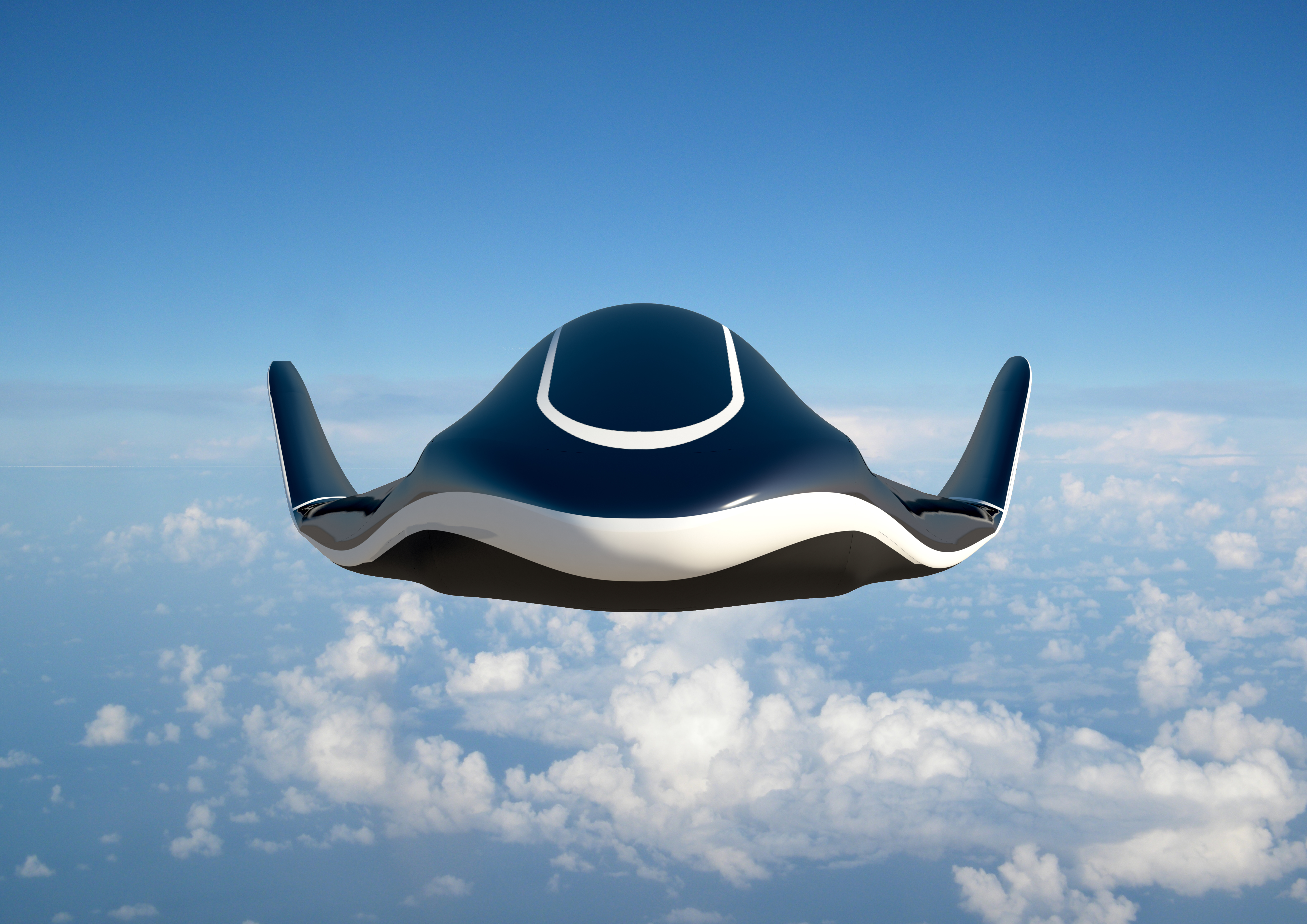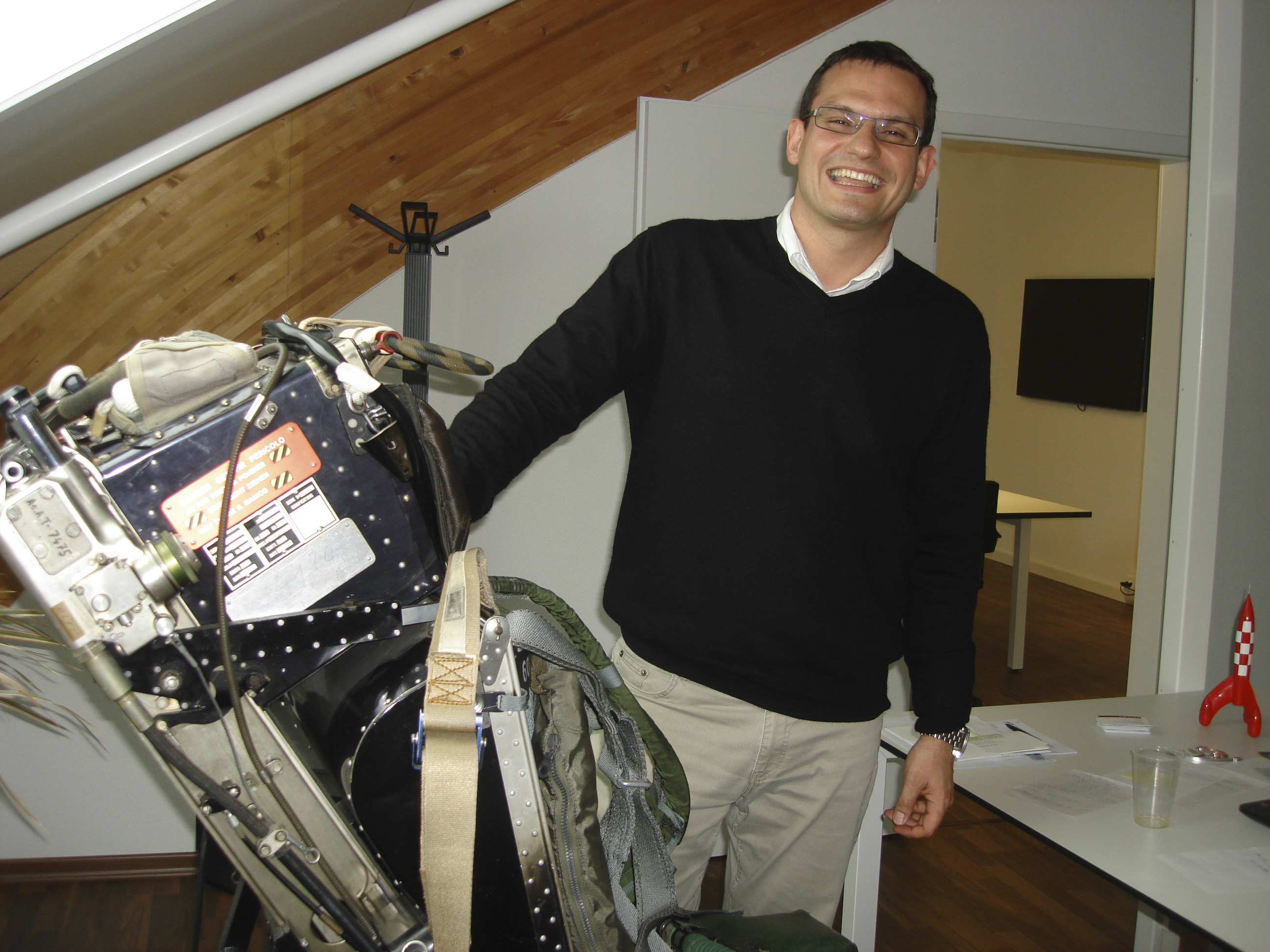
Space is closer than you think

Switzerland could be joining the space race and the lucrative satellite launch business if an ambitious project involving a reusable shuttle and recycled passenger jets comes to fruition in the small city of Payerne.
What was once a furniture warehouse in the industrial zone next to the town’s military airfield is today a 2000-square metre building fitted out with ultra-modern equipment. To get in you have to pass through a series of checks, including finger-print identification.
It’s there that Pascal Jaussi, director of the “Swiss Space Systems” project, or S3, is promising to propel Switzerland into orbit, or almost.
swissinfo.ch: You are working on a 22-metre long shuttle weighing 14 tonnes. How is it going?
Pascal Jaussi: The design stage of the shuttle, named SOAR – or Sub-Orbital Re-Usable Aircraft – will be completed by the end of 2014. It will be able to launch into orbit satellites up to 250 kilograms.
After that we shall assemble its components, in order to see how they work together. To save time and money we are using existing components from partner companies working on the Hermes [European] spaceship, and also systems from the Rafale and Falcon [Dassault] aircraft.
The first test flight is planned for 2017, and the first satellite launch in 2018.
swissinfo.ch: Why did you choose Payerne to work on the project?
P.J.: It has an airfield, and there are many specialists in aviation, design, telecommunications and electrical systems within a few dozen kilometres. Both of the Switzerland’s Federal Institutes of Technology – the ETHZ in Zurich and the EPFL in Lausanne – are relatively close.
Thirty-six-year-old Pascal Jaussi trained as a pilot, before studying at the Federal Institute of Technology Zurich (ETHZ) and working as an aircraft design engineer. He was a member of the team that tested the French Rafale fighter plane in Switzerland.
He moved to the Federal Institute of Technology Lausanne (EPFL), where, as he puts it, he had the “good fortune” to meet Swiss astronaut Claude Nicollier and Anton Ivanov of the Swiss Space Center.
To firm up the “Swiss Space Systems” project he went to Toulouse to study at the Institut supérieur de l’aéronautique et de l’espace, where he graduated with a Masters in systems engineering.
swissinfo.ch: The S3 project includes the construction of a spaceport costing CHF50 million ($53.5 million). The authorities in Payerne welcome the idea, but doesn’t it need permission from the Swiss government?
P.J.: Well, if there isn’t a spaceship standing there, it isn’t actually a spaceport. It will only become a spaceport when space-related activities begin.
By 2015, we shall have built a hangar next to the airfield in Payerne to house the two Airbus A300 aircraft modified to carry the shuttle, and the shuttle itself.
At the moment there are no norms in Europe covering the construction of spaceports and other aspects of the development of the space industry. We have taken part in a number of workshops at the European Commission level to consider legislation for private suborbital flights. Our experience with S3 means that we shall be involved when it comes to drafting certification norms, and this should prevent a situation whereby someone spends huge amounts of money and then refused permission to fly.

swissinfo.ch: Suborbital flights are a halfway house between aviation and space. What makes them interesting and attractive?
P.J.: Aviation has now passed into private hands and become a business. But the space industry has always been a state affair, a matter of national prestige. Suborbital space is halfway between, which means we can work in space as a private company.
Like the aviation industry we are interested in reasonable prices and the idea of technical support. After all, once a space ship has been launched, it has gone for ever – you don’t have to worry about post-flight maintenance. But after launch our shuttle will return to Earth. Having re-usable space equipment is a real revolution in the industry.
Technical development actually means there’s no longer any need forbig ground infrastructures (or launch pads). You just need an airfield and a pilot controlling the shuttle from the ground. The planes will fly between countries, returning to their “port of registration” for technical servicing.
swissinfo.ch: The S3 project could make Switzerland into one of the most developed countries in the space business. Mightn’t others be jealous?
P.J.: They view little Switzerland like a referee and are willing to give it the ball. Specialists from France, Belgium, Spain, Malaysia, Russia, Morocco and Mexico are already involved in the S3 project. It uses some very secret equipment, and Switzerland’s neutrality is very important. As is the Swiss ability to keep secrets…
The premises in Payerne were fitted out in conditions of great secrecy. Carpenters, electricians and plumbers all signed confidentiality agreements. Swiss astronaut Claude Nicollier joked that it reminded him of secret building work during the Cold War. I tried that joke out on one of the engineers from Russia who replied he’d spent 21 years living in a town that wasn’t even marked on the map!
There’s a whole pile of job applications waiting in our Human Resources department. And that’s good, because we are actively expanding: we started with a team of 20 and soon we’ll be a hundred.

More
Orbit remains expensive and difficult goal
swissinfo.ch: Do they all share your enthusiasm?
P.J.: We are introducing the American system of no fixed hours, which means the engineers can follow their inspiration. S3 shares its building with a fitness centre. People don’t realise it, but I do everything I can to keep them here and use them as efficiently as possible. Prepared lunches, free drinks in the bar, sport… You can stay at work from eight in the morning to ten at night.
We’ve rented an apartment block in Payerne for the foreigners. We help them to settle in with their families. Specialists can come from Russia, Malaysia and other countries, for example, to learn how to work with our planes when they land at other airports.
swissinfo.ch: It looks impressive. But you certainly have in mind the possibility of total failure…
P.J.: We discussed everything in detail with our partners in the space industry when we persuaded them to take part in our work. The European Space Agency, Dassault Aviation, the Meggitt engineering group and similar organisations could not afford to get involved in something that was doomed to failure.
Anything that could have caused the project to fail should have happened by the beginning of 2013. Now we are beyond the point of no return.
2009-2012: birth of the Swiss Space Systems project; partnership agreements drawn up, premises in Payerne fitted out.
2013: start of the company.
2014: development of SOAR shuttle completed.
2015: inauguration of the space port.
2016: assembly of shuttle completed.
2017: SOAR test flight.
2018: satellite launched.
Cost: CHF250 million.
Main sponsor: Breitling
A single satellite launch is expected to cost around CHF10 million, whereas the current cost is around CHF40 million. This could be particularly attractive to customers such as developing countries and research institutes.
(Adapted from Russian by Julia Slater)

In compliance with the JTI standards
More: SWI swissinfo.ch certified by the Journalism Trust Initiative





























You can find an overview of ongoing debates with our journalists here . Please join us!
If you want to start a conversation about a topic raised in this article or want to report factual errors, email us at english@swissinfo.ch.